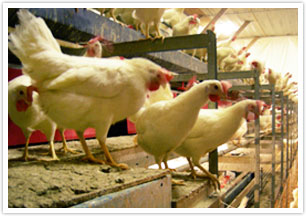Millions of chickens that live out their short lives in conditions where they can barely move, will finally be treated more like sentient beings.
All three of the largest food service companies – that deliver food to schools, campuses and corporations – are switching to cage-free eggs.
Compass Group, the world’s largest food service company, is switching to cage-free for the entire US, freeing a million hens from confinement by 2019. They also have policies with suppliers to end lifelong confinement of pigs, and a "Be A Flexitarian" program encourages customers to try more plant-based meals.
Last week, Sodexo, its top competitor, and Aramark, the largest in the US, made similar announcements. All three have been leading on sustainable policies for many years, such as seafood policies at Compass and Sodexo, and Aramark’s zero waste program at universities.

Together, these moral decisions will impact about 3.5 million chickens that produce eggs for us to eat. In the US, laws against animal cruelty do not apply to farm animals destined for human consumption. About 280 million hens produce eggs for the US market.
It’s time for the era of confining animals for profit to end, even if it’s only because of California’s new law.
Enacted in 2008 as a result of a voter referendum, the law went into effect this year. It requires calves, pigs and chickens to have enough room to lie down, turn around, stand up, and fully extend their limbs. All eggs sold in the state must come from chickens that have this modicum of space, and it pretty much bans veal crates, chicken battery cages, and pig gestation crates. What goes in California, spreads to the rest of the US.
Safeway is the first national grocer to sell only certified cage-free eggs.
Factory farms are also huges sources of water and air pollution, including greenhouse gases. Organic farms operate on different principles.
Read our article, Policies Enter Force With the New Year: Oil, Toxics, Animals.
